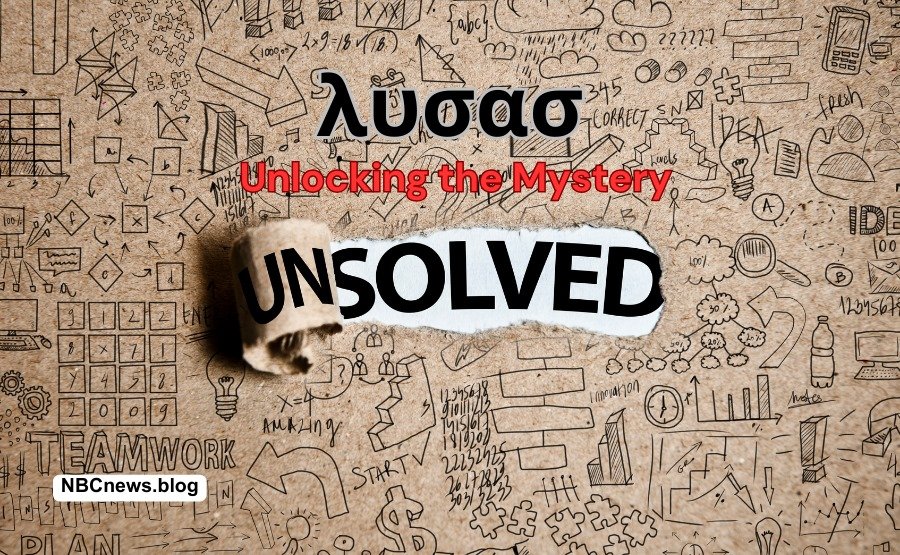Exploring the Origins of “λυσασ”
“λυσασ,” an enigmatic term that piques hobby, famous for its roots deeply embedded in the ancient Greek way of existence. Its significance transcends mere linguistic interest, resonating with layers of historical, philosophical, and cultural connotations. To resolve the mysteries inside the lower back of “λυσασ,” one needs to delve into its origins and trace its evolution through time.
Linguistic Significance “λυσασ”
In the vicinity of linguistics, “λυσασ” offers a captivating puzzle. The period originates from the Greek language, which subsequently serves a couple of abilities of 1 in every context. In its essence, “λυσασ” embodies the idea of release or liberation. This linguistic nuance consists of profound implications, resonating with freedom, emancipation, and transcendence.
Historical Context
Delving into the annals of records, “λυσασ” emerges as a beacon of choice amid tumultuous instances. Its importance echoes through ancient Greek mythology, in which stories of liberation and overcoming adversity intertwine with the fabric of cultural identification. From the heroic exploits of Prometheus to the democratic beliefs of Athens, the concept of “λυσασ” reverberates via the corridors of facts, inspiring generations to strive for freedom and autonomy.
Philosophical Implications
In the arena of philosophy, “λυσασ” assumes a transcendent first-rate, embodying the look for enlightenment and self-recognition. From the Stoic philosophers to the instructions of Plato and Aristotle, the pursuit of “λυσασ” emerges as a sizeable guiding precept of philosophical inquiry. It represents the liberation of the thoughts from the shackles of lack of knowledge and the attainment of accurate statistics and information.
Cultural Symbolism
Across cultures, “λυσασ” transcends linguistic limitations, embodying everyday beliefs of liberation and empowerment. From the battle for civil rights to moves advocating for social justice, the concept of “λυσασ” serves as a rallying cry for those trying to find to interrupt loose from oppression and inequality. Its symbolism resonates deeply with individuals and communities globally, inspiring braveness and resilience in adversity.
Contemporary Relevance
In the modern-day era, the idea of “λυσασ” continues to hold relevance as societies grapple with problems of freedom, justice, and human rights. From political revolutions to grassroots movements, the pursuit of “λυσασ” remains a pressure for robust exchange and social development. In a more and more interconnected world, the resonance of “λυσασ” serves as a reminder of the iconic human quest for liberation and autonomy.
Conclusion
In Give Up, “λυσασ” transcends its linguistic origins to encompass a timeless high-quality liberation and empowerment. From its roots in the historical Greek way of life to its contemporary-day-day relevance within the current-day worldwide, the idea of “λυσασ” resonates with profound philosophical, ancient, and cultural significance. As we navigate the complexities of the human revel, we may also additionally draw ideas from the enduring quest for “λυσασ” and try to create a global in which freedom and justice flourish for all.
FAQs About “λυσασ”
What does “λυσασ” imply?
“λύσας” is a term originating from the Greek language, which suggests release or liberation. It embodies the concept of freedom and emancipation throughout numerous contexts.
How is “λύσας” top-notch in the ancient Greek way of life?
In the historic Greek manner of life, “λύσας” held profound importance, resonating with troubles of heroism, democracy, and philosophical inquiry. It featured prominently in myths, intellectual discourses, and societal beliefs, representing the look for freedom and autonomy.
What philosophical implications does “λύσας” deliver?
Philosophically, “λύσας” symbolizes the liberation of thoughts from lack of records and the attainment of records and self-interest. It is essential to Stoic philosophy, Platonic ideals, and Aristotelian ethics, embodying the pursuit of enlightenment and transcendence.
How does “λύσας” resonate with current problems?
In modern-day society, “λύσας” stays applicable as societies grapple with troubles of freedom, social justice, and human rights. It serves as a rallying cry for movements advocating for equality, empowerment, and dismantling oppressive systems.
Can “λύσας” be interpreted uniquely in various cultural contexts?
While “λύσας” originates from the Greek way of life, its symbolism transcends linguistic and cultural limitations. It may be interpreted in a few extraordinary ways in several contexts, resonating with acquainted ideals of liberation and empowerment at some stage in numerous cultures and societies.
Read also:












1 thought on “Unlocking the Mystery of “λυσασ.””